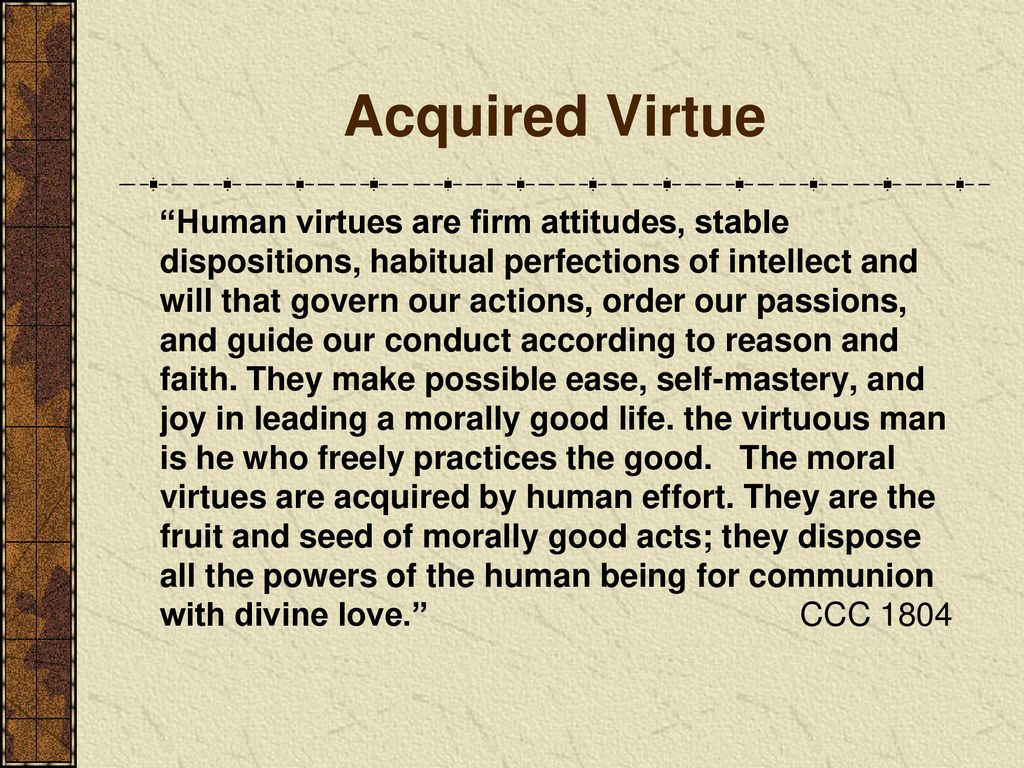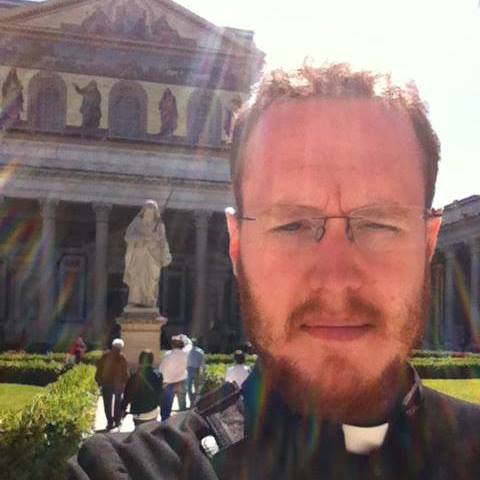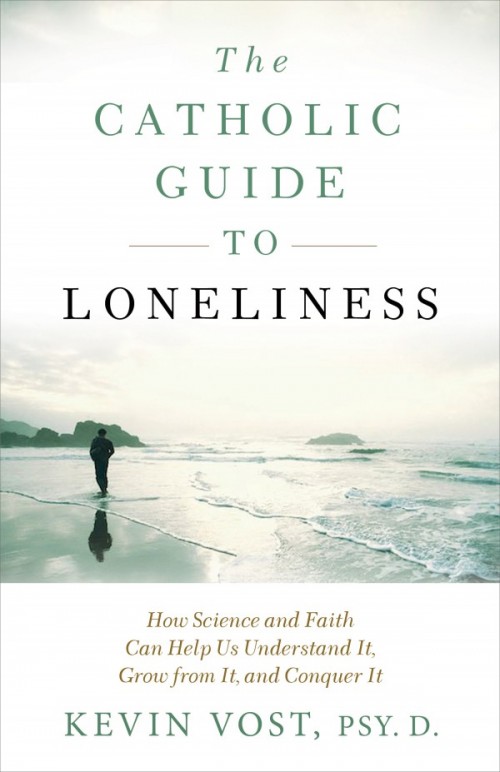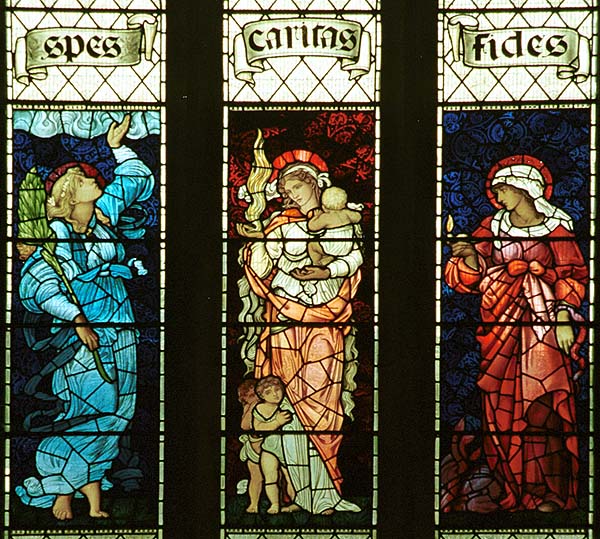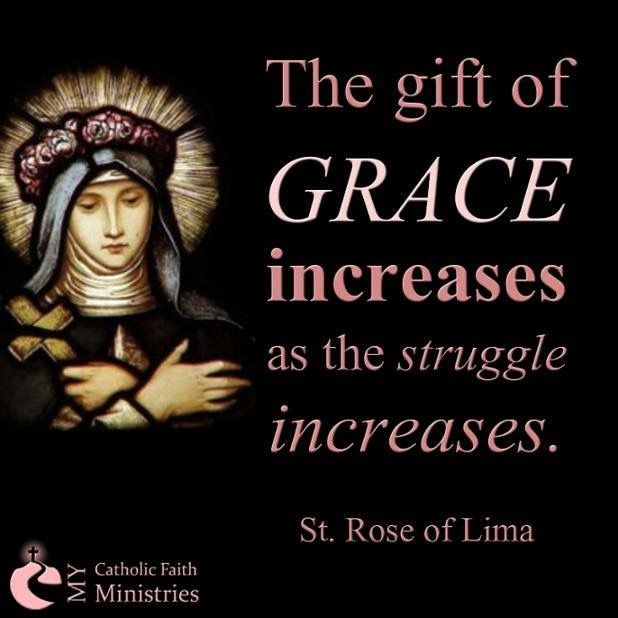
Faith is a theological virtue, which along with hope and charity, is a gift from God. But how is this so?
Theological virtues—unlike the human or cardinal virtues (justice, prudence, fortitude (courage), temperance) —are not acquired through human effort. Rather, they are “infused”; or “grafted” is another word used informally, to describe this effect in us. God uses faith like a binocular or telescope. You begin to see more with faith, you begin to understand God with faith. In God’s own time. In God’s own way, To God’s own degree for the part of His plan He has intended for you. Work with Him, people. Work with Him.
God gives everyone this potential to take that first step. In certainty the faith which is there must have you work with it. This is the gift which God gives to us. We all have this potential built inside us to know more. The problem though is we ignore this gift. We put it aside or we take other tools which will not help us. The best avenue to build up this faith is of course the Church. The Church enables us with the right tools to begin to grow in faith to take that first step into the second step. The Holy Spirit as well will help us to increase this faith.
Faith is called an infused virtue because it cannot be acquired through our efforts alone, unaided by grace. Whoever seeks the truth will find it, because God is Truth, and whoever seeks God can only do so by an effect of His grace.
God offers graces to everyone; if we cooperate, we will receive Faith. The intellect still plays a part, but it is inferior to faith, which elevates our faculty of reason, enabling us to perceive spiritual truths with greater clarity.
Many have converted to Catholicism for what appear to be intellectual reasons, but conversion is fundamentally a movement of the will towards God, Who enlightens our intellect and our hearts.
– Fidei Donum, (Pope Pius XII, 4/21/1957)
“1. The gift of faith, which through the goodness of God, is accompanied by an incomparable abundance of blessings in the soul of the Christian believer, clearly requires the unceasing homage of a grateful heart to the divine Author of this gift.
2. Indeed, it is faith that allows us to draw near to the hidden mysteries of the divine life; it is faith that encourages us to hope for everlasting happiness; it is faith that strengthens and consolidates the unity of the Christian society in this transitory life, according to the Apostle: “One Lord, one faith, one Baptism.”[Eph 4:5] It is chiefly by reason of this divine gift that our grateful hearts of their own accord pour forth this testimony: “What shall I render to the Lord for all that He hath rendered unto me?”[Ps 115:12]
3. In return for so divine a gift as this, after the due submission of his mind, what can a man do that will be more acceptable to God than to carry far and wide among his fellowmen the torch of truth that Christ brought to Us? By their zeal in promoting the sacred missionary efforts of the Church, a zeal that generously feeds the fire of Christian charity, men, ever mindful of the gift of faith, may in some way make a return to Almighty God; by so doing and imparting to others according to their ability the gift of the faith that is theirs, they are visibly manifesting their gratitude to the Heavenly Father….”
CATECHISM OF THE CATHOLIC CHURCH
PART ONE
THE PROFESSION OF FAITH
SECTION ONE
“I BELIEVE” – “WE BELIEVE”
CHAPTER THREE
MAN’S RESPONSE TO GOD
ARTICLE III. THE CHARACTERISTICS OF FAITH
Faith is a grace
153 When St. Peter confessed that Jesus is the Christ, the Son of the living God, Jesus declared to him that this revelation did not come “from flesh and blood”, but from “my Father who is in heaven”.24 Faith is a gift of God, a supernatural virtue infused by him. “Before this faith can be exercised, man must have the grace of God to move and assist him; he must have the interior helps of the Holy Spirit, who moves the heart and converts it to God, who opens the eyes of the mind and ‘makes it easy for all to accept and believe the truth.'”25
Faith is a human act
154 Believing is possible only by grace and the interior helps of the Holy Spirit. But it is no less true that believing is an authentically human act. Trusting in God and cleaving to the truths He has revealed is contrary neither to human freedom nor to human reason. Even in human relations it is not contrary to our dignity to believe what other persons tell us about themselves and their intentions, or to trust their promises (for example, when a man and a woman marry) to share a communion of life with one another. If this is so, still less is it contrary to our dignity to “yield by faith the full submission of. . . intellect and will to God who reveals”,26 and to share in an interior communion with him.
155 In faith, the human intellect and will cooperate with divine grace: “Believing is an act of the intellect assenting to the divine truth by command of the will moved by God through grace.”27
Faith and understanding
156 What moves us to believe is not the fact that revealed truths appear as true and intelligible in the light of our natural reason: we believe “because of the authority of God Himself Who reveals them, who can neither deceive nor be deceived”.28 So “that the submission of our faith might nevertheless be in accordance with reason, God willed that external proofs of his Revelation should be joined to the internal helps of the Holy Spirit.”29 Thus the miracles of Christ and the saints, prophecies, the Church’s growth and holiness, and her fruitfulness and stability “are the most certain signs of divine Revelation, adapted to the intelligence of all”; they are “motives of credibility” (motiva credibilitatis), which show that the assent of faith is “by no means a blind impulse of the mind”.30
157 Faith is certain. It is more certain than all human knowledge because it is founded on the very word of God Who cannot lie. To be sure, revealed truths can seem obscure to human reason and experience, but “the certainty that the divine light gives is greater than that which the light of natural reason gives.”31 “Ten thousand difficulties do not make one doubt.”32
158 “Faith seeks understanding”:33 it is intrinsic to faith that a believer desires to know better the One in Whom he has put his faith, and to understand better what He has revealed; a more penetrating knowledge will in turn call forth a greater faith, increasingly set afire by love. The grace of faith opens “the eyes of your hearts”34 to a lively understanding of the contents of Revelation: that is, of the totality of God’s plan and the mysteries of faith, of their connection with each other and with Christ, the center of the revealed mystery. “The same Holy Spirit constantly perfects faith by His gifts, so that Revelation may be more and more profoundly understood.”35 In the words of St. Augustine, “I believe, in order to understand; and I understand, the better to believe.”36
159 Faith and science: “Though faith is above reason, there can never be any real discrepancy between faith and reason. Since the same God Who reveals mysteries and infuses faith has bestowed the light of reason on the human mind, God cannot deny Himself, nor can truth ever contradict truth.”37 “Consequently, methodical research in all branches of knowledge, provided it is carried out in a truly scientific manner and does not override moral laws, can never conflict with the faith, because the things of the world and the things of faith derive from the same God. The humble and persevering investigator of the secrets of nature is being led, as it were, by the hand of God in spite of himself, for it is God, the conserver of all things, Who made them what they are.”38
The freedom of faith
160 To be human, “man’s response to God by faith must be free, and. . . therefore nobody is to be forced to embrace the faith against his will. The act of faith is of its very nature a free act.”39 “God calls men to serve him in spirit and in truth. Consequently they are bound to him in conscience, but not coerced. . . This fact received its fullest manifestation in Christ Jesus.”40 Indeed, Christ invited people to faith and conversion, but never coerced them. “For he bore witness to the truth but refused to use force to impose it on those who spoke against it. His kingdom. . . grows by the love with which Christ, lifted up on the cross, draws men to Himself.”41
The necessity of faith
161 Believing in Jesus Christ and in the One Who sent Him for our salvation is necessary for obtaining that salvation.42 “Since “without faith it is impossible to please [God]” and to attain to the fellowship of his sons, therefore without faith no one has ever attained justification, nor will anyone obtain eternal life ‘But he who endures to the end.'”43
Perseverance in faith
162 Faith is an entirely free gift that God makes to man. We can lose this priceless gift, as St. Paul indicated to St. Timothy: “Wage the good warfare, holding faith and a good conscience. By rejecting conscience, certain persons have made shipwreck of their faith.”44 To live, grow and persevere in the faith until the end we must nourish it with the word of God; we must beg the Lord to increase our faith;45 it must be “working through charity,” abounding in hope, and rooted in the faith of the Church.46
Faith – the beginning of eternal life
163 Faith makes us taste in advance the light of the beatific vision, the goal of our journey here below. Then we shall see God “face to face”, “as he is”.47 So faith is already the beginning of eternal life:
When we contemplate the blessings of faith even now, as if gazing at a reflection in a mirror, it is as if we already possessed the wonderful things which our faith assures us we shall one day enjoy.48
164 Now, however, “we walk by faith, not by sight”;49 we perceive God as “in a mirror, dimly” and only “in part”.50 Even though enlightened by him in whom it believes, faith is often lived in darkness and can be put to the test. The world we live in often seems very far from the one promised us by faith. Our experiences of evil and suffering, injustice and death, seem to contradict the Good News; they can shake our faith and become a temptation against it.
165 It is then we must turn to the witnesses of faith: to Abraham, who “in hope. . . believed against hope”;51 to the Virgin Mary, who, in “her pilgrimage of faith”, walked into the “night of faith”52 in sharing the darkness of her Son’s suffering and death; and to so many others: “Therefore, since we are surrounded by so great a cloud of witnesses, let us also lay aside every weight, and sin which clings so closely, and let us run with perseverance the race that is set before us, looking to Jesus the pioneer and perfecter of our faith.”53
25 DV 5; cf. DS 377; 3010.
26 Dei Filius 3:DS 3008.
27 St. Thomas Aquinas, STh II-II,2,9; cf. Dei Filius 3:DS 3010.
28 Dei Filius 3:DS 3008.
29 Dei Filius 3:DS 3009.
30 Dei Filius 3:DS 3008-3010; Cf. Mk 16 20; Heb 2:4.
31 St. Thomas Aquinas, STh II-II,171,5,obj.3.
32 John Henry Cardinal Newman, Apologia pro vita sua (London: Longman, 1878) 239.
33 St. Anselm, Prosl. prooem.:PL 153,225A.
34 Eph 1:18.
35 DV 5.
36 St. Augustine, Sermo 43,7,9:PL 38,257-258.
37 Dei Filius 4:DS 3017.
38 GS 36 § 1.
39 DH 10; cf. CIC, can. 748 § 2.
40 DH 11.
41 DH 11; cf. Jn 18:37; 12:32.
42 Cf. 16:16; Jn 3:36; 6:40 et al.
43 Dei Filius 3:DS 3012; cf. Mt 10:22; 24:13 and Heb 11:6; Council of Trent:DS 1532.
44 1 Tim 1:18-19.
45 Cf. Mk 9:24; Lk 17:5; 22:32.
46 Gal 5:6; Rom 15:13; cf. Jas 2:14-26.
47 1 Cor 13:12; 1 Jn 3:2.
48 St. Basil, De Spiritu Sancto, 15,36:PG 32,132; cf. St. Thomas Aquinas, STh II-II,4,1.
49 2 Cor 5:7.
50 l Cor 13:12.
51 Rom 4:18.
52 LG 58; John Paul II, RMat 18.
53 Heb 12:1-2.

-by Br Damian Day, OP
“Saul stood by with a heart harder than the stones striking Stephen. Unconvinced by Stephen’s eloquent preaching, unmoved by his miracles, blind to his angelic countenance, blinder still to his burning love, the eyes of Saul’s soul, sealed shut by the weight of stone scales, saw only darkness.
How many of our co-workers, friends, neighbors, loved ones, seem similarly unseeing before the love that has flooded our hearts? Yes, “God’s love has been poured into our hearts” (Rom 5:5), which burn when we hear those words, “As the Father has loved me, so have I loved you; Abide in my love” (Jn 15:9).
How much it pains our hearts to see our loved ones wandering without that one thing that can satisfy—and more than satisfy—the tortured depths of the human heart.
How can these signs and wonders, miracles, words of wisdom, acts of charity, the love of martyrs, not move all hearts? Yet, Saul stood stubborn seeing Stephen see the Son standing at God’s right hand in glory.
Is the love that fills our hearts so weak, so unattractive, so insufficient?
Love is a subtle thing, patiently plodding, plowing forward when the ground seems all stones where never a thing could grow. But persistently, consistently, love works, bursting forth unexpectedly with abundant fruit.
As the mob disbanded, retrieving their coats from Saul’s watch, leaving Stephen’s blood soaking the stones, all the deacon’s mighty words and deeds, all his eloquence, his very love, seemed insufficient.
But even as Saul scattered the Church, Stephen’s love worked behind the scenes. St. Fulgentius of Ruspe says that in “his holy and tireless love he longed to gain by prayer those whom he could not convert by admonition.”
With love never growing tired, Stephen loved those unmoved by what he loved most. Stephen’s insistent love shattered the dark, adamant stone of Saul’s heart, which the Lord converted after the likeness of his own heart. Has ever a heart changed so much?
Stephen’s blood watered the stony soil of Saul’s soul. Like the Lord he loved, Stephen became as a grain of wheat that, unless it “falls into the earth and dies, it remains alone; but if it dies, it bears much fruit” (Jn 12:24). That fruit we still taste whenever we receive the words of Paul’s preaching or behold them shake the soul of a St. Augustine.
May we love those dearest to us as Stephen loved Saul, yea, as Christ has loved us, loved us to the end (Jn 13:1).
Love, I believe, Lord, help my unbelief! Mk 9:24
Matthew
